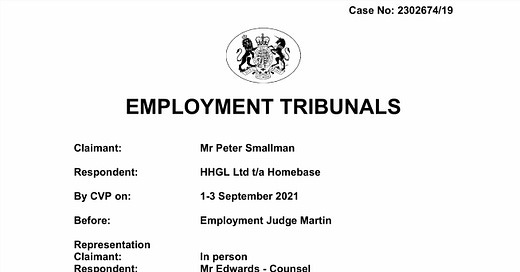Homebase worker legitimately dismissed for failing to follow a reasonable management instruction
Mr Smallman was given every possible assistance when trying to facilitate an amicable way forward for the parties, but clearly it wasn't enough.
Homebase go the extra mile but there comes a point when enough is enough!
I can imagine the frustration felt by management at Homebase when they make an offer most people would jump at is thrown back at them.
Mr Smallman was employed as a Team Member for two and a half years and worked at the Folkestone branch. During his employment he raised a number of grievances. Some might say they were bizarre, in that in one in particular, he alleged Homebase was involved in hypnosis and neurolinguistic programming which would have a profound effect on staff both at home and at work.
He suggested that a manager, adjusted taps in the toilets (so that very little water came out) to be nasty to employees despite them sharing these facilities with the public. During an investigation into his grievances, it was reported by a colleague that Mr Smallman had told him that he wanted his local manager to die a slow and painful death!1
As I said the grievances are bizarre to say the least. The grievances were investigated and it transpired, as part of the investigation into one particular grievance, that a number of colleagues complained about his behaviour. This in turn led to a disciplinary investigation and he was subsequently suspended.
It was at this point Homebase had to make a decision. They could continue with the disciplinary process, where in all likelihood Mr Smallman would be dismissed, or alternatively, he could be transferred to another store within the region in Broadstairs and make a fresh start.
His Statement of Terms and Conditions of Employment2 (contract) contained a mobility clause which gave Homebase the right to insist he transfer providing they could establish they had reasonable grounds for doing so:
‘You have been selected to work in NAME store (your normal place of work). We sometimes need to review our demand for colleagues and as a result, where we have reasonable grounds for doing so, we may change your normal place of work and transfer you to an alternative store in the area or within reasonable traveling distance of your home. If this is the case we will let you know, giving you reasonable advance notice.’
Given that relationships between Mr Smallman and staff had irretrievably broken down at the Folkestone branch, Homebase wrote to him and explained that it was felt unlikely that relationships could be restored and a solution was for him to to the Broadstairs store.
They would cease all disciplinary and grievance matters and draw a line in the sand. He was invited to a meeting to discuss the proposal. He rightly raised the issue of added travel time and expenses and Homebase offered to change his rota and pay travel expenses. The company even agreed to cut his working hours by 30 minutes per day with no loss of pay.
Despite the ‘inducements’ Mr Smallman refused to move to the Broadstairs store. It was at this point the Company decided he had to move and they were done negotiating the issue. They wrote to him:
‘As a result of this decision, l confirm that we will not proceed with your disciplinary hearing, nor investigate your outstanding grievances and therefore this concludes both processes. In doing so this does not apportion blame or determine right or wrong as it is already clear the relationships with the personnel in Folkestone store are untenable.
This outcome draws a line in the sand to enable us to move forward in a constructive way’
He was then provided with instruction about turning up for work at Broadstairs and reporting to his new manager. He was specifically told not to report for work at Folkestone:
‘To be clear, you are not to attend Folkestone store as you are on the rota tomorrow at Broadstairs rather than Folkestone. We hope it is not necessary but, should you attend Folkestone rather than Broadstairs store, we will have no option but to treat this as failure to comply with a reasonable instruction.’
So, he duly attended work at Folkestone and, not surprisingly, he was immediately suspended and ultimately dismissed for failing to follow a reasonable management instruction.
Comment
What I find interesting about this case is that Homebase could easily have dismissed Mr Smallman without offering him the move. He was a short serving employee and he was clearly a cause for concern. I’m not so sure I would have been so keen to facilitate a move to another store given the nature of his grievances. Who is to say history would not repeat itself?
All credit to Homebase for looking for a workable solution. To continue with the disciplinary would benefit nobody because relationships had clearly broken down. The mobility clause gave them them a workable solution and provided a lifeboat to Mr Smallman. Despite their best endeavours he declined to jump aboard.
That was a grave error. The Company had the right to insist on the move, the instruction to move was reasonable and accordingly his dismissal for failing to follow the instruction was fair in all the circumstances.
Sometimes, doing the right thing can backfire. In hindsight, Homebase could have saved a significant amount of time and expense if they had moved to dismiss at the outset rather than trying to keep a member of staff in employment, but credit to them for trying.
The case has been reported in the Mail Online.
If you have any thoughts on this piece or any other employment matter? Please leave a comment.
Taken from the Tribunal judgment
Notwithstanding his contract was unsigned the Judge held he was bound by the mobility clause.




